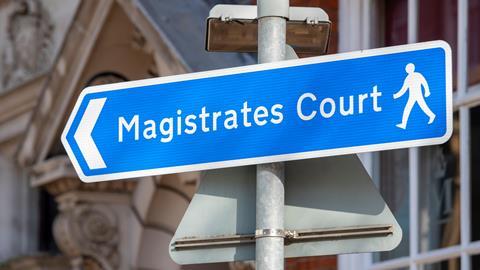Magistrates have called for radical reforms to the single justice procedure (SJP), used by magistrates’ courts to deal with minor offences, the Magistrates’ Association has announced.
The SJP, introduced in 2015, handles 40,000 cases each month without the need for a court hearing. Driving without car insurance, non-payment of the TV licence fee and not having a valid train ticket are all regularly dealt with by the SJP. Cases are often heard by a single magistrate who is supported by a legal adviser. A newer form involves three magistrates sitting independently with a legal adviser ‘on standby’. Defendants can enter a plea online.
However in a new position on the SJP, the Magistrates’ Association said many members are uncomfortable with the process as it currently works. The organisation found a ‘significant’ proportion of members feel they do not always get as much time as they need to properly consider each case.
An eight-page position statement includes 12 recommendations to improve the operation, transparency and fairness of the SJP. The association says: ‘While the SJP deals with the least serious cases in the system, they are still serious to those subject to it. Defendants—charged with offences from having no TV licence to fare evasion— deserve fair and transparent justice. They should know that their case has been dealt with fully, with any mitigation they may have supplied being properly considered.
‘It is important that the SJP is not, and should not be seen as, a "fast-track" or "justice-light" process. It must operate and be resourced accordingly.'
Recommendations include a requirement that prosecutors see all pleas and mitigation before cases are heard by the magistrate and the provision of specific training. Magistrates should not be put under any pressure ‘to complete a certain number of SJP cases within a certain amount of time’.
The recommendations also include publishing of more data on SJPs to improve transparency as well as provision for SJP sittings to be observable by accredited journalists. Magistrates should provide short explanations in cases where they deviate from sentencing guidelines.
Wider recommendations include a ‘concerted effort to publicise the importance of responding to official court letters. This must also make the rights of the defendant clear, for example, that they can opt out of the SJP and ask for their case to be heard in open court’.
Mark Beattie, national chair of the Magistrates’ Association, said: ‘We believe that the principle of the single justice procedure is good. Every year it spares thousands of defendants the ordeal of having to attend court for minor offences, and it allows for more efficient use of court time, which means speedier justice and a focus on more serious offences.

‘However, it is not a perfect system. While the vast majority of cases are handled effectively by the SJP, our members — magistrates who decide on SJP cases — have told us about flaws in the way it operates and the harm that this can have on some of society’s most vulnerable people.
‘It is clear to us that reform, as well as additional investment in training and transparency, is needed, to restore public confidence in the single justice procedure. This is why we have made a total of 12 recommendations today, to change the single justice procedure and make it fairer, more consistent and more open.’
This article is now closed for comment.




























7 Readers' comments